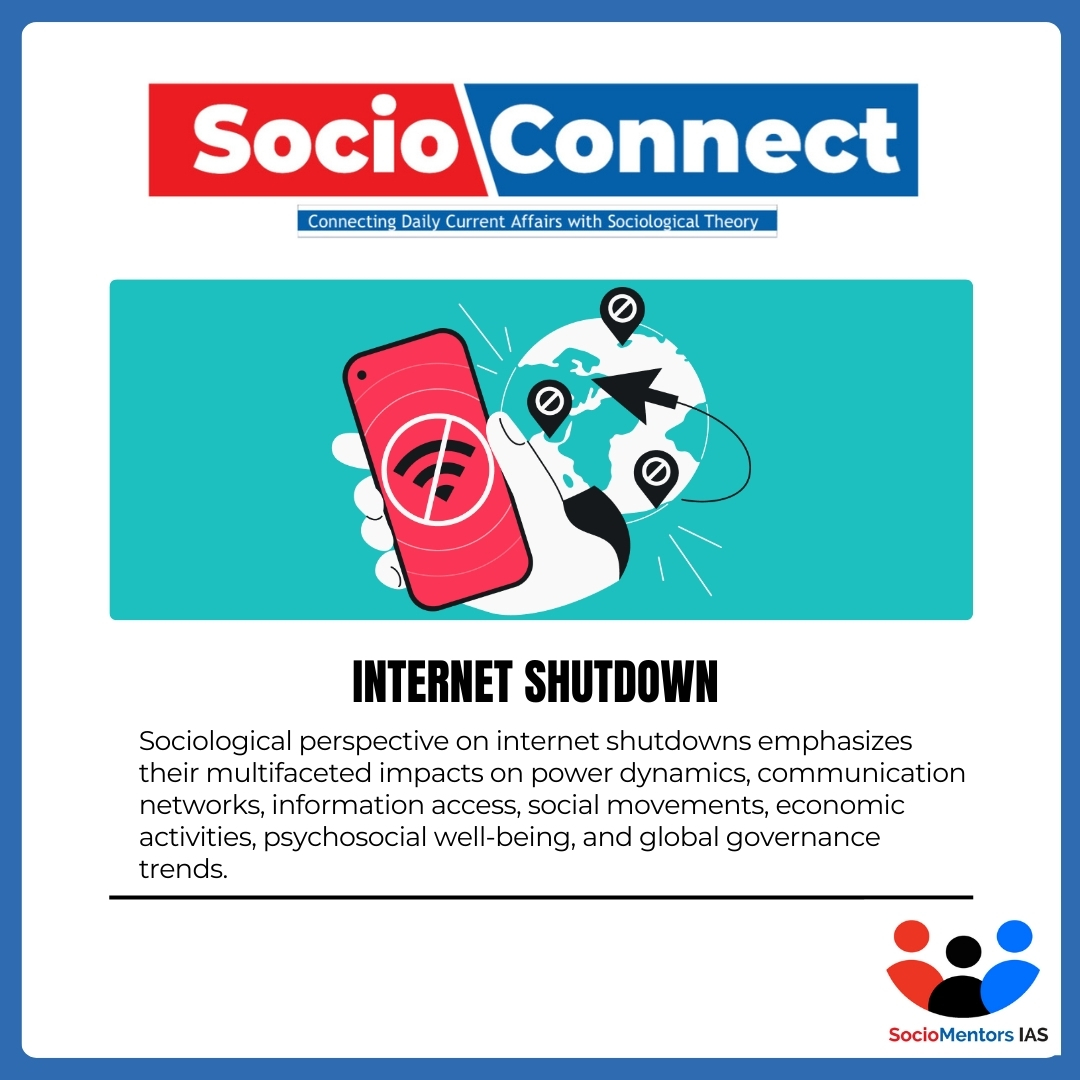Internet Shutdown – UPSC Sociological Perspective
July 23, 2024
Internet shutdown refers to a deliberate suspension of internet services in a limited area, for a given amount of time, usually on the orders of the government. In 2016 and 2017, India reported the highest number of internet shutdowns in the world (Kaur 2017). Recently, six states, including West Bengal, Jammu and Kashmir, Uttar Pradesh, Madhya Pradesh, Punjab and Rajasthan, had issued shutdown orders to deal with various law and order situations Globally, internet shutdowns rose by 41% in 2022, out of which, India accounts for 53% of all the global instances.
Internet shutdowns in India are often imposed by the government as a law and order measure. It is done to curb the spread of misinformation and rumors that can lead to deteriorating law and order situations. Shutting down the internet helps maintain peace among communities in times of crisis.
Why Internet Shutdowns are worrying:
- The internet in the past few years has become a great enabler for people to exercise various fundamental rights, such as the right to free speech, right to associate, right to practise any profession, right to access information, and right to education.
- Disruption of online avenues like digital education platforms will impact education of the students, especially in the era of hybrid mode of learning.
- In simplifying and fastening communication, internet has played a significant role in facilitating people to mobilise, voice their concerns, and bring about a political change. The “Arab Spring,” “Sunflower Revolution,” “Jan Lokpal” movement, Washington’s Women’s March, and #MeToo campaign are a case in point. Internet shutdowns can impact such social movements.
- Internet-enabled services like online shopping, cab services, food delivery, online courses, have opened up huge business and educational opportunities for people. Internet shutdowns can seriously affect the economic capital of the country due to disruption of activities like digital payments, e-commerce, online services etc.
- For instance, shutdowns reportedly led to loss of $118 million in foreign investment from Jan-June 2023 in India.
- Another example, during the six-month communication blockade in Kashmir in 2019, over five lakh people lost their jobs. This can lead to rising unemployment and relative deprivation.
- United Nations Human Rights Council has noted the potential of internet as a great enabler for humans to achieve the ideals of freedom and progress. It has on several occasions reiterated that access to internet is a human right. The right to education and right to information have been recognised as fundamental rights by the Supreme Court and Parliament as well.
- The current government’s flagship programme, the “Digital India” campaign too recognises the potential of internet in improving governance. It aims to empower the citizen digitally by providing universal mobile connectivity and public internet accessibility. Internet shutdowns will have a negative bearing on access to government services, especially the welfare programmes.
- Another dysfunctional aspect of internet shutdowns is regional imbalances. Frequent internet shutdowns in some specific pockets have led to unequal growth and flow investments in such regional pockets. E.g. Kashmir, North Eastern region etc.
- In 2023, 64 orders affected multiple districts within the same state, including a statewide shutdown in Punjab.
- In worst cases, internet shutdowns can result in the blockage of passing important intels or dissemination of information in situations and places like disaster hit areas. This can cause damage to lives and even death in certain cases.
Sociological Analysis
- Internet shutdowns are often viewed through the lens of power and control. Internet shutdowns are often used to silence marginalized groups or quell protests. This reinforces existing power structures and can exacerbate social inequalities. From Weberian power perspective, this connotes to the zero sum theory of power, where power is concentrated in the hands of very few.
- Glaser highlights how the internet empowers social organization and mobilization. Shutdowns, in his view, disrupt these capacities and hinder democratic processes.
- Rising internet shutdowns and unequal regional development will lead to a situation of anomie and may promote deviant behaviour.
- From an Interactionist perspective, online modes of communication and interaction with self, family and other societal members would get distorted on the suspension of internet facilities. This can result in the alienation of individuals.
- From a feminist perspective, internet shutdowns as tactics used by governments to silence dissenting voices, including women activists, journalists, and human rights defenders. Shutting down the internet limits women’s ability to communicate, organize, and advocate for their rights online.
- Nanjira Sambuli advocates for technological sovereignty, which entails ensuring that communities have control over their digital infrastructures and platforms. She critiques internet shutdowns as violations of digital rights and sovereignty.
On the other hand, thinking from the perspective of the State and functionalist perspective, internet shutdowns have been utilized in many instances as it was deemed necessary on grounds like:
- To curb acts of deviance by restraining organization of serious forms of resistance and protests that can affect public order and safety.
- Preventing dissemination of hate speech and false information that incites violence, riots and leading to polarization of society.
- Apart from the manifest function of establishing a peaceful milieu, internet shutdown also has helped in performing latent functions of maintaining social stability, solids and cohesion.
The impact of internet shutdowns extends far beyond mere disruption of online services; it strikes at the heart of fundamental rights, democratic freedoms, and socio-economic stability. Government should explore less intrusive measures like selectively blocking websites or content, issuing warnings or advisories, engaging with civil society and media, or deploying additional security forces. As governments grapple with security concerns, it is crucial to find balanced approaches that safeguard both public safety and the rights of individuals to access information, express themselves freely, and participate fully in the digital age.



